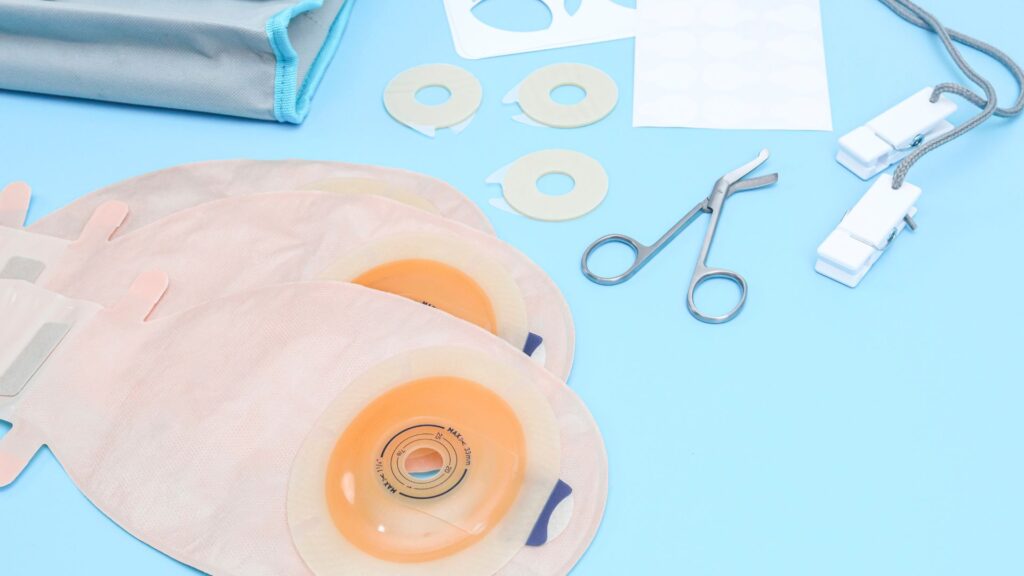In Australia, as in much of the world, living with a stoma bag is often shadowed by stigma and misconceptions. Yet, many individuals with stomas lead full, active lives, proving that a medical condition does not define one’s capabilities or quality of life.
We explore the reality of life with a stoma bag, supported by statistics, discuss reasons necessitating a stoma, and spotlight the ongoing efforts of institutions like the KC Skills Centre in providing essential care training.

Understanding Stoma: The What and Why
A stoma is a surgically created opening on the abdomen that allows waste to exit the body and be collected into a stoma bag or pouch. Stomas are usually formed as part of treatments for various conditions affecting the digestive or urinary systems.
Reasons for stoma creation include:
- Cancer: Conditions like Colorectal Cancer can necessitate the removal of part of the bowel, resulting in a stoma.
- Inflammatory Bowel Disease (IBD): Diseases such as Crohn’s and Ulcerative Colitis, which cause severe inflammation and damage to the gastrointestinal tract, often require surgical intervention.
- Bowel Injury or Obstruction: Accidents or other medical emergencies can lead to the need for a temporary or permanent stoma.
- Bladder Conditions: Such as Bladder Cancer, where the bladder is either removed or bypassed.
Stoma in Australia: By the Numbers
Over 45,000 Australians live with a stoma, according to the Australian Council of Stoma Associations. The number underscores the importance of comprehensive support and awareness to manage this life-altering condition effectively.
Australia is also the only country in the world that provides individuals with free stoma care supplies. The motion passed after a key member of the South Australian parliament underwent surgery and had to live with a stoma for several years and realised the need for better stoma care in the country.
Famous Faces, Shared Experiences
Public figures with a stoma have helped increase visibility and reduce stigma.

Notably, Brittani Nicholl Australian surfer Brittani Nicholl was diagnosed with Crohn’s disease when she was only seven years old. She has had stoma bags more than once.
The first time, she had a section of her bowel removed because she was so sick it was putting her life in danger. She had that bag for more than three years. Something similar happened several years later. This time, she kept the bag for nine months.
A stoma bag didn’t keep Nicholl out of the ocean, though. She credits some of her ability to manage it to the people who are around her. “With a great support network, I was able to get through it and to my surprise, I was able to surf and live a relatively normal life,” she told Sportitude in 2017.
She suggests that people living with IBD and stoma bags keep a positive outlook and keep pushing toward their goals. “You will have your down times and question things, but at the end of the day, it is important to keep pushing through no matter how hard it gets,” she told Allied Magazine in 2022.
Living Actively and Fully
Individuals with a stoma can engage in almost all activities they enjoyed pre-surgery. With proper management, people with a stoma can:
- Engage in Sports and Exercise: Many return to sports with a specially designed stoma guard, including swimming and running.
- Travel: With some planning regarding supplies and facilities, travel remains a joyous possibility.
- Work: Post-recovery, individuals can return to their professional roles, as a stoma generally does not inhibit job performance.
- Socialise and Maintain Relationships: Social interactions and personal relationships continue unaffected with the right support and understanding.
Empowering Care: KC Skills Centre’s Role
Key to living well with a stoma is appropriate care and support.
The KC Skills Centre in South Australia plays a pivotal role here, offering specialised Bowel and Stoma Care Training. Their programs are designed for both personal and professional carers, equipping them with the knowledge and skills to provide high-quality care to individuals with stomas. Training includes understanding the physical and emotional needs of stoma patients, hands-on skills for stoma care, and insights into the accessories and products that assist daily stoma management.

The journey of living with a stoma bag is unique to each individual, but it doesn’t have to be a limiting one. Through education, understanding, and proper care, the stigma associated with stomas can be dismantled, allowing those affected to lead rich, fulfilling lives.
By highlighting the capabilities rather than limitations, supporting organisations like the KC Skills Centre foster a more inclusive and supportive environment for everyone living with a stoma. Together, we can move towards a society where a stoma is not seen as a hindrance but another aspect of life’s rich tapestry.


